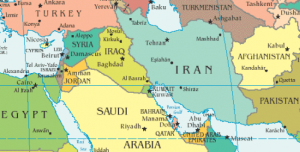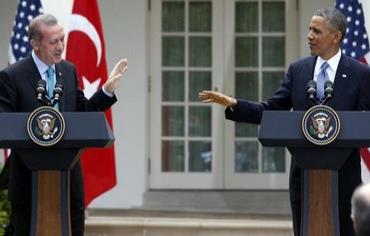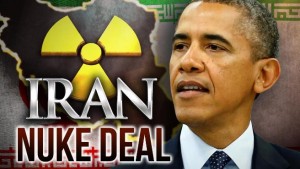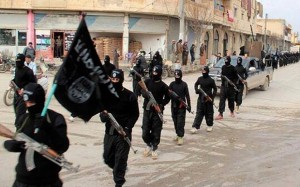Chairman’s Note – Our thanks to Clare Lopez as the senior editor and members of the Legacy National Security Advisory group for all the research and time to develop this important and critical document. Counterjihad security architecture and strategies are more necessary now than ever before.
Paul E. Vallely; Chairman – Stand Up America US
Editor’s Note – This article was updated to include headings for sections of the document on 2.26.16 at 11:0015 AM Pacific.
Legacy National Security Advisory Group
For far too long, United States foreign policy, especially in the critical region of the Middle East and North Africa, has been pursued with apparent scant attention, much less priority, given to core, compelling U.S. national security objectives in the fight to defeat the Global Jihad Movement. This paper, therefore, offers a blueprint for a counterjihad security architecture for America that identifies those objectives and outlines the measures necessary to provide for the common defense of our Constitution, Republic, and society in this existential struggle of our time.
The U.S. has limited national security objectives in the MENA region, but they are important and must be precisely defined. The following are those objectives:
- We must defend U.S. diplomatic, intelligence, and military assets, facilities, and equipment, and ensure the security of our personnel serving abroad.
- We must keep open the naval, maritime, and commercial sea-lanes and defend the free passage of oil and other commercial goods.
- We must prevent control of the Strait of Hormuz, Bab al-Mandab, Red Sea, and Suez Canal by jihadist or other forces hostile to the U.S., the West in general, and our partners and allies.
- We must defend and support our regional allies, primary among which are Egypt, the Jewish State of Israel, Jordan, and the Kurdish people.
Seek Balance of Power
It is in U.S. national security interests to seek regional stability, including a balance of power between local Shi’ite and Sunni Islamic forces, however rough or imperfect that balance may be. We must avoid actions that would further destabilize the region, unless compelled in defense of other core U.S. national security objectives. We should refrain from involvement in historical, intra-Islamic sectarian struggles, again, unless compelled in defense of other core U.S. national security objectives. We must accept the reality that Sunni-Shi’ite relations are and will remain messy. We must understand that fashionable policies like ‘exporting democracy,’ ‘COIN (Counterinsurgency)-winning hearts and minds’ and ‘nation building’ are futile among societies in thrall to Islamic Law (shariah). Sometimes accepting local strongman rule that supports U.S. and Western interests, even though not democratic, is the lesser of two evils when the alternative would be either chaos or an Islamic jihad-and-shariah takeover.
Rebuild the Military
We must rebuild the U.S. military ASAP. This includes re-establishing the presence of the Sixth Fleet in the Mediterranean Sea and the Second Fleet in the Atlantic Ocean. Sequestration has decimated the readiness of the U.S. military to respond effectively to key national security requirements, set back modernization of our forces, and hollowed out our overall military capabilities. This must be reversed on an accelerated basis. Given the known penetration of the U.S. military by operatives and sympathizers of the Muslim Brotherhood, we must carefully vet all Muslim chaplains in the U.S. military for jihadist sympathies and/or Muslim Brotherhood connections.
Defeat the Global Jihad Movement
We must acknowledge the enemy threat doctrine of Islamic Law (shariah) is pursued as a matter of doctrine and faith by the Global Islamic Movement including devout Muslims across the world. The White House must formulate, publish, and implement a new National Security Strategy that defines Islamic Law (shariah) as an enemy threat doctrine. It must be a priority objective of this new National Security Strategy to deter and defeat Islamic jihad globally. To do this, it will be necessary that U.S. national security leadership understand that the shariah threat is advanced by way of jihad, which may be kinetic or non-kinetic (head, heart, hands, including funding).
The U.S. Intelligence Community, with new leadership at the White House, National Security Council, Office of the Director of National Intelligence, Director of Central Intelligence, and other key positions, must acknowledge, identify, and remove the jihadist penetration of and influence operations against the U.S. government, especially at top levels of national security. Such a revised National Security Strategy will include consideration of nation states, sub-national jihad groups, individual jihadis, transnational jihadist organizations like the Islamic State/Caliphate, Muslim Brotherhood and Organization of Islamic Cooperation (OIC), associated criminal, gang, and narcotrafficking groups in its overall threat matrix because they all work together, if only on an ad hoc, opportunistic basis.
Guided by such understanding of the Global Jihad Movement (GJM) threat and a new National Security Strategy designed to counter and defeat it, the next task of the U.S. President and his national security team will be to name, define, prioritize, confront, and defeat threats to U.S. national security objectives from U.S. adversaries in the MENA and Central Asian regions, their sponsors, and proxies. Iran is far and away the most critical, dangerous U.S. adversary in the region.
Its Weapons of Mass Destruction (WMD) programs, especially nuclear and Electromagnetic Pulse (EMP) programs and Intercontinental Ballistic Missile (ICBM) delivery systems, pose an existential threat to the U.S. mainland as well as to regional allies like Israel. The expansionist, revolutionary geo-strategic objectives of the Tehran regime derive from the Islamic canon and are expressed in both the Iranian constitution and military doctrine (details of which are now in U.S. possession). The Shi’ite Twelver eschatology of the top Iranian leadership, both clerical and military, actively seeks Armageddon to hasten return of 12th Imam and launch the Islamic End Times.
Iran’s preferred tactic for expansion, power projection, and terror operations relies on proxy forces: Al-Qa’eda, HAMAS, Hizballah, Iraqi Shi’ite terror militias, the Islamic State (IS) and the Taliban. We must develop plans for regime change in Iran to end the mullahs’ pursuit of deliverable nuclear weapons, an EMP-kill-shot capability, support for terrorism, revolutionary expansionism, and appalling human rights abuses against their own people.
 At the same time, we must understand the Sunni Islamic State, its objectives, and what it represents for the region, vulnerable target areas across the globe, and for individual Muslims worldwide.
At the same time, we must understand the Sunni Islamic State, its objectives, and what it represents for the region, vulnerable target areas across the globe, and for individual Muslims worldwide.
It must be acknowledged that the Islamic State embodies the hopes and dreams of hundreds of millions among the Muslim ummah that had been without a Caliphate since 1924, for the first time since the early days of Islam.
Thus, we must acknowledge that the identifiable, self-declared ambitions of the forces of jihad focus on establishment of that global Caliphate (Islamic governance) under Islamic Law (shariah).
Islamic State & Middle East Implosion
Since its lightening expansion during 2014, the Islamic State generally has been contained in geographic terms in its core area of operations in the former states of Iraq and Syria, both of which have been dominated by Iranian satrap regimes essentially since President George W. Bush removed the regime of Saddam Hussein in Iraq in 2003 and dismantled his Sunni-majority army. It is not in the best interests of U.S. national security to intervene in this intra-Islamic Shi’ite-Sunni fight in any way that tips the advantage to either set of Islamic jihadis, whether Shi’ite or Sunni, but all of whom are dedicated enemies of the U.S., Israel, and the West.
The former states of Iraq and Syria were artificial constructs to begin with, drawn on maps by colonial powers in the 20th century. That they now are splintering along pre-colonial ethnic, sectarian, and tribal lines is likely unavoidable but not a process that threatens core, compelling U.S. national security interests in the region or calls for U.S. involvement to oppose. On the other hand, jihadist groups and individuals outside of this Middle Eastern region that have been pledging bayat (allegiance) to IS and Abu Bakr al-Baghdadi and that generally pre-date the formation of IS, should be targeted by Western powers on a case-by-case basis where their elimination would not simply accrue to the benefit of other jihadist groups or states. Islamic State as well as other jihadist affiliates in Libya and elsewhere must be countered and defeated; the U.S. should provide broad-spectrum assistance against IS forces as requested by local allies and partners and/or as in the best interests of the U.S., to eradicate such presence in their territories. This assistance may include diplomatic, financial, intelligence, military, and political measures.
Hijra to the West
Many jihadist pro-shariah groups and individuals already have made the hijra (migration) to the West and live among us with the intent of ‘destroying [our] miserable house from within’ (as stated in the Muslim Brotherhood’s 1991 report, ‘The Explanatory Memorandum’). Physical annihilation of the Islamic State’s Middle East Caliphate is a necessary ultimate objective that will set back the Global Jihad Movement but not destroy it, principally because the GJM already has a presence worldwide and because the ideology of jihad derives directly from the Qur’an, hadiths, Sirat, and shariah of the Islamic canon.
Intra-Islamic Rivalries
Fellow jihadist organization and sometime Islamic State rival Al-Qa’eda is not dead: it is vibrant and currently engaged in savage rivalry with the IS and others over dominance of the Global Jihad Movement. AQ regional affiliates have multiplied since 9/11 and today include: Al-Qa’eda in the Arabian Peninsula (AQAP), Al-Qa’eda in the Islamic Maghreb (AQIM), Jabhat al-Nusra, and the Taliban, among numerous other jihadist groups. The AQ-IS rivalry is likely to impel each to seek to out-do the other with terror operations targeting the U.S., the West, Israel, and other allies.
U.S. national security leadership, military officers and personnel, and local law enforcement officers must read and study the AQ Timeline for Conquest of the West (as published in August 2005 by Der Spiegel). We are now in Phase Six of Seven (2016-2020 is the time of ‘total confrontation’). This timeline should be made required reading at all service academies, Staff/Command and War Colleges and throughout the Pentagon. The U.S. must re-establish all training curriculum materials and instructors previously purged under Muslim Brotherhood influence that accurately teach the threat from Islamic jihad and shariah.
Whither Turkey?
The Turkish regime under President Recep Tayyip Erdogan harbors neo-Ottoman jihadist aspirations and under current leadership cannot be considered a viable NATO or Western ally unless its behavior significantly turns toward supporting U.S. and NATO objectives. Rather, Turkey is a destabilizing force in the Middle East, especially because of its apparently fixed resolve to oust the Syrian regime of Bashar al-Assad. Further, this jihadist Turkish leadership views Israel as a Jewish enemy and Iran and Saudi Arabia both as Islamic rivals for regional domination.
Turkey has supported IS since its inception because it views the group as a capable proxy force against Bashar al-Assad. Turkey also supports other jihadist militias including Ahrar al-Sham. Ankara’s permission for IS and other jihadis to use Turkey as a gateway to Syrian battlefields, establish terror training camps on its territory, and find safehaven there, eventually will threaten Turkey itself. Turkey’s enduring enmity towards the Kurds, both within Turkey and elsewhere, ensures ongoing, destabilizing efforts by Ankara to attack, counter, and degrade the Kurds’ equally determined nationalist aspirations. Pro-West, anti-jihadist Kurds are a natural ally for the U.S. and should be recognized and aided as such.

US President Barack Obama and Turkish PM Recep Tayyip Erdogan in Washington. Photo: REUTERS
About Russia
Russia is not a Middle East regional power but seeks to project power and influence there. Russian President Vladimir Putin’s KGB-controlled Kremlin is not a U.S. partner: it is an adversary whose expansionist ambitions and longtime collaboration with Islamic terror groups and regimes like Iran’s must be countered firmly.
Putin’s Middle East objectives center on sea access to the southeastern littoral of the Mediterranean Sea, oil interests, and foreign military sales, to include elements of nuclear, chemical, and biological weapons programs and other large scale weaponry and armaments. Despite protestations of seeking to forestall chaotic destabilization, Moscow’s Middle East regional objectives and behavior run counter to U.S. national security interests.
These include Russian support for Iran’s nuclear, other WMD, and ballistic missile programs; its determination to ensure that Bashar al-Assad or other Moscow-friendly regime will retain power in Damascus; its historical intelligence and military ties to Middle Eastern terrorist groups, including Hizballah, PFLP, PLO, Iranian Khomeinists and their successors, as well as the Muslim Brotherhood and Al Qa’eda; the supply of advanced military hardware and associated capabilities to forces inimical to U.S. national security interests in the region; the destabilizing, catastrophic human rights effects of savage bombing in civilian areas and against U.S.-backed Syrian rebel groups like the Syrian Free Army; and displacement of historical U.S. influence with regional governments (e.g., Egypt).
Saudi Arabia: Font of Jihad Ideology
Saudi Arabia is a font of global jihad ideology. Despite the necessity of working with the Saudis to counter other, more dangerous regional threats like Iran and IS, Riyadh royals must be recognized for the civilizational adversary that they are, who have backed, exported, and funded jihad worldwide for decades.
A principal reason why the Kingdom of Saudi Arabia has not fielded a serious military force to counter IS is that Saudi regime depends for legitimacy on its Wahhabi clerical establishment which finds more in common with IS’ pure practice of Islam than with dissolute Saudi princes. That Saudi Arabia at some point may face attack from Iran and/or IS, or that its eastern oil fields region may come under Iranian and/or IS frontal and/or subversive pressure adds complexity to defense of U.S. interests in the region, but should not blind us to the essential jihadist nature of the Saudi leadership.
The Iran Threat
America needs a new U.S. National Security Strategy to defeat the Global Jihad Movement. To accomplish this, we must first name the jihadist Iranian regime the number one most immediately critical threat to U.S. national security in the Middle East region and perhaps in the world. We must develop plans to destroy Iran’s key nuclear infrastructure, including key military and civilian facilities, e.g., power grids, IRGC, IRGC-Qods Force, Bassij, and Ministry of Intelligence and Security (MOIS) command centers, etc. We must end official collaboration with and/or support for the Iranian regime, its puppet regimes in Baghdad, Beirut, and Damascus, and/or any of its proxies, including Hizballah, Iraqi Shi’ite militias, and the Taliban. We must declare formal U.S. government commitment to regime change in Tehran, support for the free expression of the will of the Iranian people, and our willingness to work with Iranian opposition groups, especially the Mujahedeen-e Khalq (MeK) and its political umbrella group, the National Council of Resistance of Iran (NCRI).
 We must abrogate the Joint Comprehensive Plan of Action (JCPOA) and declare Iran’s nuclear weapons program illicit and in violation of the nuclear Non-Proliferation Treaty (NPT) and multiple UN Security Council (UNSC) Resolutions. We must declare Iran’s illicit nuclear weapons program a valid target for possible military and/or other offensive action unless any and all suspect sites are immediately opened to IAEA inspections that include U.S. nationals on the teams.
We must abrogate the Joint Comprehensive Plan of Action (JCPOA) and declare Iran’s nuclear weapons program illicit and in violation of the nuclear Non-Proliferation Treaty (NPT) and multiple UN Security Council (UNSC) Resolutions. We must declare Iran’s illicit nuclear weapons program a valid target for possible military and/or other offensive action unless any and all suspect sites are immediately opened to IAEA inspections that include U.S. nationals on the teams.
We must declare Iran’s ballistic missile program in violation of UNSC Resolutions and subject to possible military and/or other offensive action until/unless verifiably dismantled.
We must demand full accounting for Iran’s past nuclear weapons program work and should withhold funding for the IAEA until it reverses its capitulation to Tehran regime on the so-called Possible Military Dimensions (PMDs) of the Iranian nuclear weapons program. We must demand immediate and unconditional release of all U.S. hostages held by the Iranians and/or any of their terror proxies.
Secure the Grid
It is absolutely critical that we secure the U.S. civilian electric grid ASAP. Its continued vulnerability to EMP attack by Iran, North Korea, or other adversary, to cyber-attack, physical terrorist attack, or to periodic massive solar flares called Coronal Mass Ejections is unconscionable when the technical capability exists to harden the grid and the actual financial cost is so affordable, relative to the threat that life as we know it in America could end. Both the Critical Infrastructure Protection Act (CIPA) and the SHIELD Act must be passed out of Congress and signed by the President without any further delay.
Support Israel
The U.S. should announce a return to full, vocal official diplomatic commitment to the survival of the Jewish State of Israel within secure borders and end all funding for the Palestinian Authority and the UN Relief and Works Agency (UNRWRA). We must renew and upgrade the U.S. defense relationship with Israel and accelerate approval for sales of the Massive Ordnance Penetrator (MOP) and other bunker-busting munitions to Israeli Defense Forces (IDF). The U.S. should provide the IDF with enhanced air refueling capability and consider other, enhanced collaboration on and funding for the Iron Dome, Arrow, David’s Sling, Magic Wand, and other missile defense systems as well as other defensive measures.
The Department of State should open bilateral discussions on countering Iran’s existential threat to Israel, including the possibility of Israel ‘taking its bomb out of the basement’ and announcing commitment to the principle of anticipatory self-defense under international law. And symbolically, but most important of all, the U.S. should move its official Embassy from Tel Aviv to Jerusalem, which is the eternal, undivided capital of the Jewish State of Israel. Our very visible and strong relationship with Israel must be seen as unequivocal in the eyes of the international community.
Kurdish National Aspirations
The U.S. should declare official support for the national aspirations of the Kurdish people, whether in autonomous zones or something more formal (to be the subject of discussions). We should upgrade immediately U.S. military and weapons assistance to the Kurdish Peshmerga that are fighting forces of the Damascus regime as well as IS. We should expand the U.S. economic commitment to Kurdish-controlled areas for development & infrastructure projects.

FILE – This undated file image posted on a militant website on Tuesday, Jan. 14, 2014 shows fighters from the al-Qaida linked Islamic State of Iraq and the Levant (ISIL) marching in Raqqa, Syria.
In terms of a broader U.S. regional strategy, we should announce a ‘non-intervention’ policy for the intra-Islamic Shi’ite-Sunni struggle. This should not, however, necessarily obviate continued U.S. air strikes, or the targeted deployment of Special Operations forces against IS in the Caliphate area of operations on a limited basis.
We should arm, back, fund, and train U.S. regional allies, including Egypt, Israel, Jordan, the Kurds, and other minority groups including Christians and Yazidis.
We should consider expansion of the U.S. military commitment to counter IS in other areas outside of its Middle East core area of operations such as in North and West Africa; Egypt/Sinai Peninsula, and elsewhere. It is most important that we ensure U.S. actions do not tip the balance in favor of either Shi’ite or Sunni jihadist enemies.
A Hostile Foreign Powers List
Domestically, the President should seek Congressional legislation to designate a new listing for Hostile Foreign Powers, to which all jihadist entities, whether kinetic or subversive, national, sub-national or transnational, would be named. The new listing would be the basis to purge all U.S. federal, state, and local bureaucracies of pro-shariah jihadist influences, especially the Muslim Brotherhood, its front organizations, and associated individuals. We must re-establish an official U.S. government-wide training curriculum to instruct on Islamic doctrine, law, scriptures and their role as inspirational sources for Islamic terrorism.
The Department of Justice must begin prosecution of the 200-plus unindicted co-conspirators in the 2008 Holy Land Foundation HAMAS terror funding trial. The President must instruct the FBI to investigate and the Department of Justice to prosecute sedition and material support for terrorism aggressively. If found guilty of subversion and / or sedition of the United States of America, mosques and the associated imams or mullahs that preach sedition and jihad must be closed, and their religious leaders, if indicted, will be prosecuted and, if necessary deported or imprisoned.
Immigration & Refugee Resettlement
It is critical that the U.S. develop comprehensive immigration and refugee resettlement policy reform. We should prioritize funding for refugees already in safe camps in the Middle East to remain near their former homes so as to improve the likelihood they will go home whenever the situation permits. The President and State Governors should seek Congressional legislation that requires involvement by state and local jurisdictions in every step of the immigration and refugee resettlement process.
The Departments of Homeland Security, Justice, and State must begin to apply discriminatory vetting to exclude those who favor or harbor jihadist ideology or are unlikely to assimilate well into US society. Federal agencies should selectively favor immigration, refugee processing, and visas for Middle East Christians, Yazidis, and others persecuted for their religious beliefs.
Finally, candidates for public office, Congressional representatives, defense and national security officials, and all who accept the responsibilities incumbent on those who take the oath of office to ‘protect and defend the Constitution against all enemies foreign and domestic’ should see the Secure Freedom Strategy, published by the Center for Security Policy in 2015, for a whole-of-government, whole-of-society approach to defeating the Global Jihad Movement: http://www.centerforsecuritypolicy.org/the-secure-freedom-strategy/

